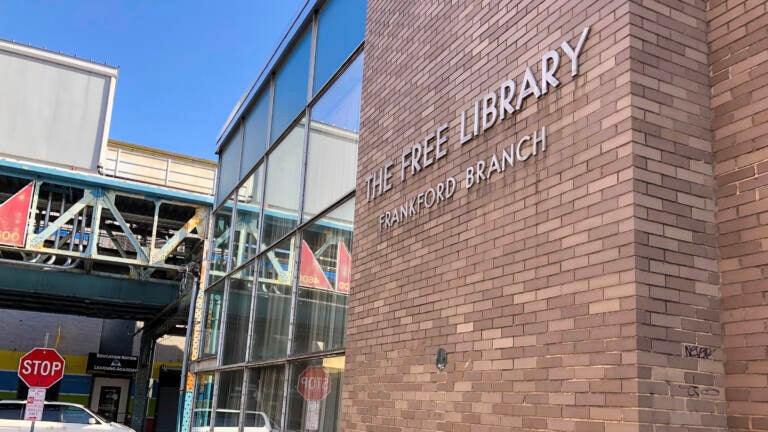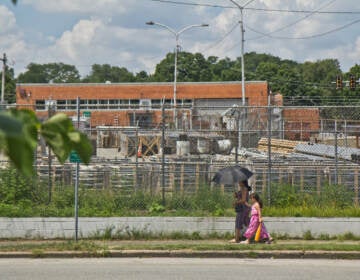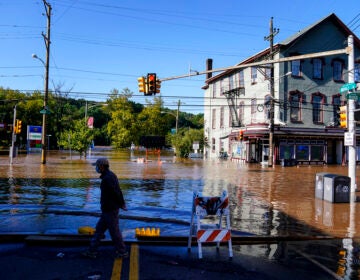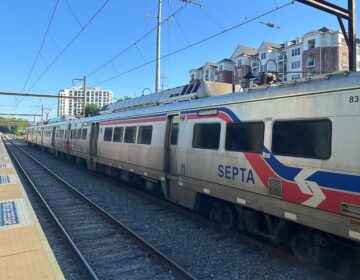Philly expands cooling centers for next heat emergency, focusing on libraries and rec centers instead of buses
Emergency management officials plan to use 13 libraries and 21 rec centers as cooling centers this summer.

File photo: The Frankford Library was one of the city's designated cooling centers in summer 2022. (Asha Prihar/Billy Penn)
This story is part of the WHYY News Climate Desk, bringing you news and solutions for our changing region.
From the Poconos to the Jersey Shore to the mouth of the Delaware Bay, what do you want to know about climate change? What would you like us to cover? Get in touch.
If temperatures prompt the city of Philadelphia to declare a heat health emergency this summer, officials plan to open cooling centers at fewer parked SEPTA buses and many more existing public facilities — including 21 rec centers — than last year.
“These are community spaces every day and really do have a good plan, every day, of how to meet people where they’re at with what they need,” said Dominick Mireles, director of the city’s Office of Emergency Management.
The city has not yet released a list of planned cooling center locations for this summer, in order to avoid any confusion as plans evolve. Cooling centers are only activated during heat health emergencies, which the city Department of Public Health declares when the heat index — which reflects both temperature and humidity — is forecast to reach certain thresholds for multiple consecutive days.
Human-caused climate change is making heat waves more dangerous. Average summer temperatures have risen several degrees Fahrenheit across much of the country, according to the nonprofit Climate Central. In Philadelphia, the average summer temperature has gone up more than 3 degrees in the last five decades, and the average nightly low temperature during the summer has risen even more. The city now experiences roughly eight more days per year when the heat index is above 90 degrees than it did in 1970.
Last summer, the city set up cooling centers at 11 libraries with extended hours, six senior centers, and 10 Philadelphia Housing Authority facilities. The city also designated four parked SEPTA buses as cooling centers, located in North, South, and West Philly.
This year, emergency management officials are planning at least 50 brick-and-mortar cooling centers, including extended hours at 13 libraries, 21 rec centers, six senior centers, and 10 Philadelphia Housing Authority facilities. The city could supplement these locations with buses if needed to maintain a cooling center within a mile of each of the city’s most heat-vulnerable areas, Mireles said, but emergency management officials are trying to move away from the bus model.
Philly first used parked buses as cooling centers in 2020, when officials said fewer libraries were available due to staffing issues and COVID health guidance. The city has continued to use cooling buses each summer since. They attracted more than 600 visitors over the past three summers, according to statistics provided by Office of Emergency Management spokesperson Jeffrey Kolakowski.
Anecdotally, city staff noticed people tended to pop into the cooling buses for a few minutes while waiting to catch another bus, Mireles said, rather than travel to the cooling buses specifically to access the air conditioning.
Buses can be deployed wherever they’re needed, but they lack amenities like bathrooms and water fountains, Mireles noted. They may also be harder for residents to find than libraries or rec centers.
“[Libraries or rec centers] are facilities that are known and trusted locations,” he said.
Idling buses also contribute to planet-warming carbon emissions and unhealthy local air pollution, Mireles noted.
“Having a building that’s on the city grid, electrical power, is just a more sustainable solution in our eyes,” he said.
Libraries also have free WiFi, books, programming, trained staff, and other resources. For example, Blackwell Regional Library — which served as a cooling center last summer — offers free menstrual and post-partum products, Narcan, COVID tests, and fentanyl tests, said regional librarian Nani Manion.
“Provided that our AC is working in all parts of the building and we have the staffing, a patron who is coming in for cooling center hours could use the computer, they could browse for books, they could charge their laptop, and use the WiFi and do their own work,” Manion said. “Blackwell has a lovely infant/toddler space. … There’s just more happening than a SEPTA bus.”
Manion said that people should not hesitate to come to a library cooling center, even if they once had outstanding fines on their library cards. Philly’s libraries eliminated late fees in 2020.
“We’re fine-free. We are welcoming,” Manion said. “We want to reduce barriers, because we’re all in this climate change crisis together.”
Still, cooling centers are not a silver bullet for helping people survive heat waves. People may have a hard time getting to the centers, or may not be aware that they’re available. And cooling centers are not open overnight.
“It can be challenging to get from point A to point B, even to point B is air-conditioned,” Manion said.
The Office of Emergency Management tries to choose cooling center locations that are accessible by transit routes and that serve areas of the city with the greatest exposure to heat, such as North Philly and parts of West, South, and Northeast Philly.
“Neighborhoods that maybe don’t have a lot of tree cover, or the blacktop particularly reflects and retains a lot of direct sunlight,” Mireles said. “Places like that, that are measurably hotter than other parts of the city.”
The city promotes its cooling centers through the news media, on social media, by spreading the word to community partners, and on its website.
“Get in the habit of checking the city’s resource page,” Mireles said.

Subscribe to PlanPhilly
WHYY is your source for fact-based, in-depth journalism and information. As a nonprofit organization, we rely on financial support from readers like you. Please give today.









